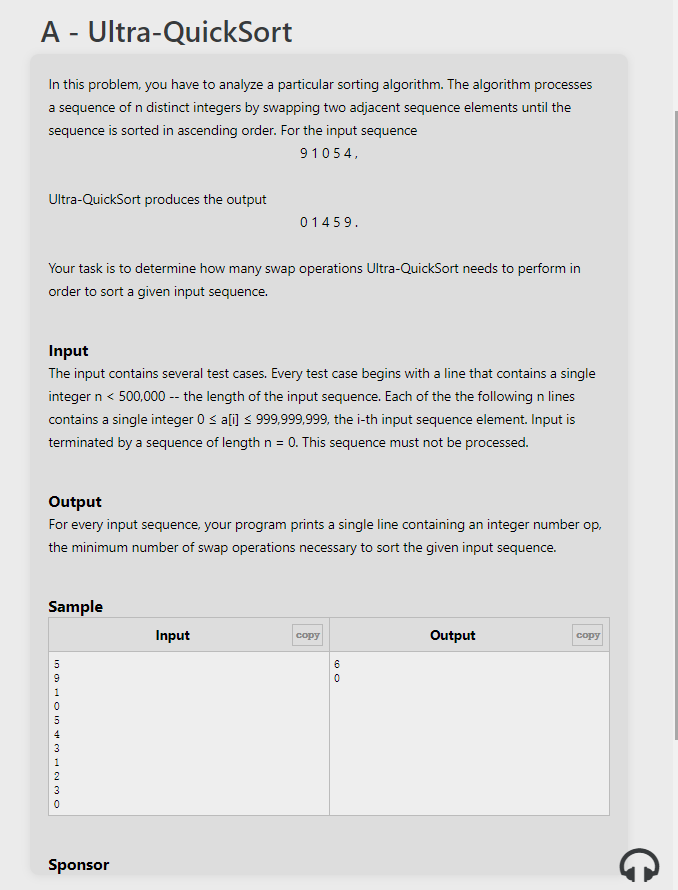树状数组求逆序对
逆序对
逆序对就是序列a中ai>aj且i<j的有序对。
根据上面的定义我们很快的就可以写出O(n^2)的算法,即枚举j,再枚举所有小于j的i,统计ai>aj的数量。但这个算法的时间复杂度过高。
如果我们能快速的统计出ai>aj的数量,时间复杂度就可以得到很好的提升。
树状数组就可以做到这一点
我们可以先开一个大小为a的最大值的数组t,每当读入一个数时,我们可以用桶排序的思想,将t[a[i]]加上1,然后我们统计t[1]~t[a[i]]的和ans,ans - 1(除掉这个数本身)就是在这个数前面有多少个数比它小。我们只要用i-ans就可以得出前面有多少数比它大,也就是逆序对的数量。
点击查看代码
但这样如果数据很大的话空间会过大
比如 1 2 3 4 10 我们要开大小为10的数组存储,可有用的仅是列出的数据,5 6 7 8 9的空间被浪费了
为了解决这个问题,我们可以在读完数数据后对他进行从小到大排序,我们用排完序的数组的下标来进行运算。这样可以保证小的数依旧小,大的数依旧大。这一步叫做离散化。
点击查看代码
__EOF__

本文作者:w1210
本文链接:https://www.cnblogs.com/w1210323/p/18020323.html
关于博主:评论和私信会在第一时间回复。或者直接私信我。
版权声明:本博客所有文章除特别声明外,均采用 BY-NC-SA 许可协议。转载请注明出处!
声援博主:如果您觉得文章对您有帮助,可以点击文章右下角【推荐】一下。您的鼓励是博主的最大动力!
本文链接:https://www.cnblogs.com/w1210323/p/18020323.html
关于博主:评论和私信会在第一时间回复。或者直接私信我。
版权声明:本博客所有文章除特别声明外,均采用 BY-NC-SA 许可协议。转载请注明出处!
声援博主:如果您觉得文章对您有帮助,可以点击文章右下角【推荐】一下。您的鼓励是博主的最大动力!




【推荐】国内首个AI IDE,深度理解中文开发场景,立即下载体验Trae
【推荐】编程新体验,更懂你的AI,立即体验豆包MarsCode编程助手
【推荐】抖音旗下AI助手豆包,你的智能百科全书,全免费不限次数
【推荐】轻量又高性能的 SSH 工具 IShell:AI 加持,快人一步
· 无需6万激活码!GitHub神秘组织3小时极速复刻Manus,手把手教你使用OpenManus搭建本
· Manus爆火,是硬核还是营销?
· 终于写完轮子一部分:tcp代理 了,记录一下
· 别再用vector<bool>了!Google高级工程师:这可能是STL最大的设计失误
· 单元测试从入门到精通